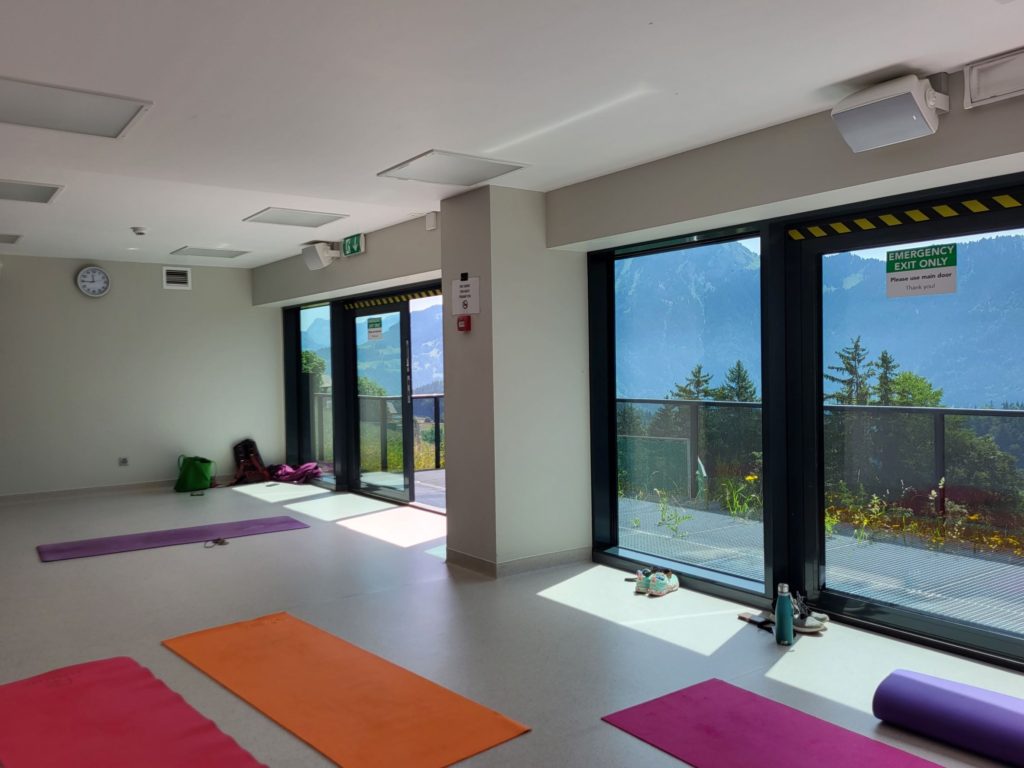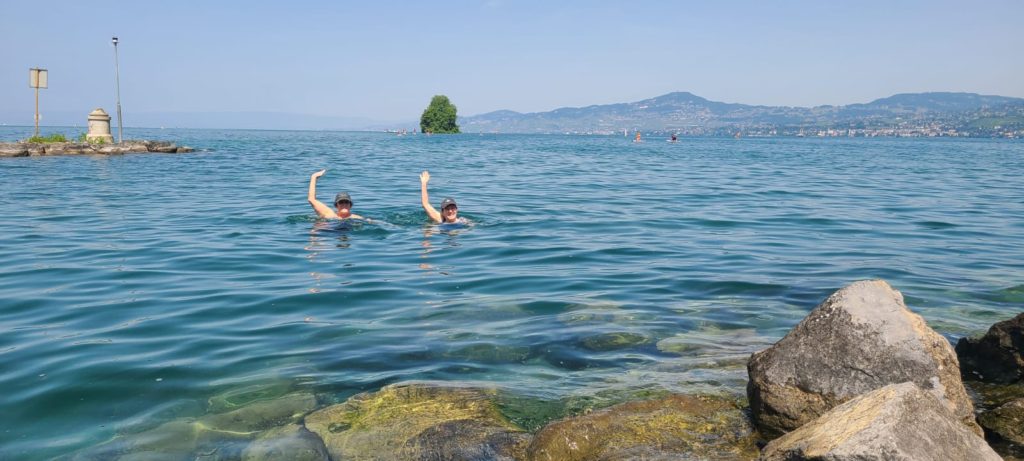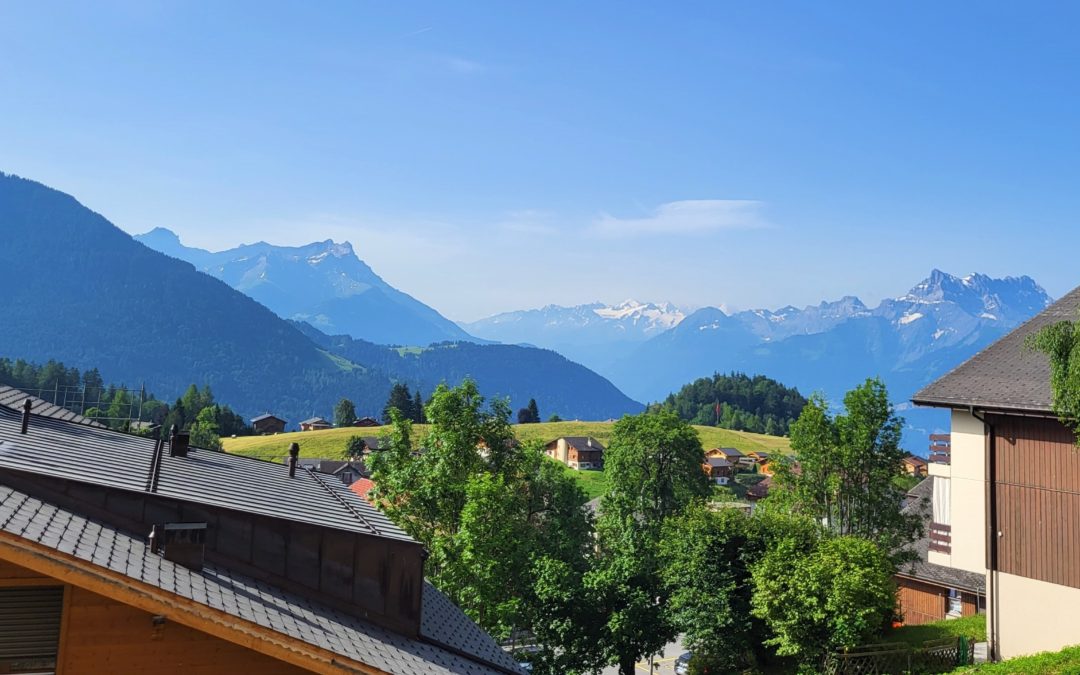Like many Americans who are long-timers in France, I’m often asked what led me to choose a life overseas.
There are many reasons. But the origin story begins on an Alpine peak in Switzerland.
I spent my high-school junior year in Leysin, a village in the French-speaking part of the country. I attended Leysin American School, an English-language boarding school, as a day student while my professor-parents, on sabbatical, taught at the American college there and my sisters went to the local Swiss school.
Then, LAS was small and a tad grungy. But the school, then and now in a collection of former tuberculosis hospitals, has prospered. Enough to sponsor, last weekend, a reunion of every class that had ever attended. More than 1,000 people returned, including a handful from the year I was there.

Photo: Richard O’Sullivan
In my day, almost all the students were boarders. They were mostly Americans, kids whose fathers (it was a long time ago) worked in expat jobs or government positions in Libya, Saudi Arabia, Lebanon, the Soviet Union, Sweden and many more. They had traveled a lot, and they were independent. They thought nothing of going to Montreux or Lausanne on the weekend, or flying thousands of miles to and from the school alone.
Still, the school was something of an American bubble. Our soccer and basketball teams played other American schools in Switzerland. All our classes except languages were in English. The village shopkeepers and the ski instructors mostly spoke passable English. The school play (that’s me in the middle in this rehearsal photo) was in English.

But languages such as French and German were taught by native speakers. Even though I had studied French since fourth grade, it was in Leysin that I learned to speak an acceptable version (and thus was able to speak to my then-teacher in her native language when she showed up at the reunion dinner).
That led to French classes when I went to college and encouraged me to spend my junior year in Paris. Which in a roundabout way drew me back to Paris as a foreign correspondent and then as a permanent resident.
Today, the school is less than 10% American. The biggest nationalities are Mexican, Brazilian, Russian and, until COVID-19 hit, Chinese. There’s no butt room for cigarette smokers (happily). LAS now boasts a huge sports center, dorm rooms with their own showers, an arts room and a music center. Graduates go to topnotch colleges. Tuition, room and board costs total $114,000, though 30% of the students get some kind of financial aid.

I took a yoga class in the sports center in a room that gave out on a mountain view, glass doors open so we could hear the birds singing.

Which brings me to the reunion’s activities. The program read rather like the wives’ programs of reunions at the then-all-male New England boarding school my husband attended (No panel discussions, for instance. Yay!). The list included hikes, winetasting, cheese shopping, paddle boarding (and some illegal swimming) on Lake Geneva, as well as rides up the cable car to the high peaks.

Photo: Richard O’Sullivan
This choice of activities was not an accident, nor an insult to the intelligence of the attendees. Leysin, then and now, is all about the mountains. The entire village, reached from the east end of Lake Geneva, sits on a steep slope facing the Diablerets mountains. Behind and above us were craggy peaks we could hike to in one day. My family could see the tip of Mont Blanc from the top balcony of our chalet (though not in this photo of my sisters).

Photo: H.R. Swardson
Imagine a view so incredible every day that even a teenager appreciates it. We lived and breathed mountains. In the winter, school ended every day at 2 p.m. so that we could put on our gear and walk to the nearby ski lift. In the summer, we walked in the high fields under the ski lifts with the local livestock.

Many of the friends I reconnected with talked about this. “You leave the mountain but the mountain doesn’t leave you,” said one. “The town changes but the mountains stay the same,” said another. With no parents present, the boarding students had each other, and the mountains. Many of the stories told last weekend, unsurprisingly, involved iterations of substance abuse, alcohol consumption and clandestine hookups in secret places – including the mountains.
What values did that leave us with? One thing I have always noticed about the school’s graduates is that there seems to be few apparatchiks, whether in business or government. People own their own businesses, or run nonprofits, or raise racehorses, or teach.
Some even are journalists, another field where independence and autonomy are valued. So thanks for that too, mountains.
Planted in Paris is going on vacation for the summer. Unless occasional inspiration strikes, I’ll resume in the fall. Thank you to all for reading so faithfully.

Anne – What a wonderful experience to reconnect with friends from one year in your formative teen age life and the setting was incomparable. I want to astro fly there right now!
Thanks, Ellen! I highly recommend it.
Leysin, Annie, what an awesome read!
So true about the mountains, my first view was the morning after we arrived, (John, Louise, Emily, Peggy &I) and I drew open the curtains on the room sized windows at the hotel and saw the jaw dropping scene of those gorgeous mountains. Only recently did the edelweiss I picked that day fall apart…time to go pick another.
Definitely!
I’m so glad you all had a great time! We were hoping to be there but had to cancel our plans at the last minute😡.
So sorry! I hope you can get there some time.
Nice one…..
Thanks!
This is fascinating! Thank you for recounting this (to me) idyllic experience. I remember hearing parts of it. Didn’t Peggy also attend for a year?
Thanks, Ginger. Yes, Peggy was with us, it was wonderful to have a companion that year.
Hello Anne,
I loved this story and only wish my family had been more adventurous. I didn’t get to Paris until I was 60. I’m so grateful to Sandy who insisted on it. I wish I had done it in my teens.
I’m not complaining. I’m more and more aware every day that I have lived my life during the “sweet spot” of the US, having been born just after the war, White and to competent parents.
Fondly,
Winky
Thanks, Winky. I was definitely lucky!
Loved your reminisce of Leysin. I would never get tired of the view(s).
No more blog for the summer. Does that mean we may see you in Brooklin? We’ve seen Jamie and Tim often since we’ve been here. Regards to you and Charlie.
Jim
Thanks, Jim!
Very nice recap of the weekend and description of why we are all drawn back to the magic mountain. Good to see you, I will definitely be following your writing on your blog.
Thank you! It was great to see you.
I didn’t know any of this- I really enjoyed reading it. Have a great summer Anne.
Thanks, Pat!
Enviable experiences (especially during your student days), and a remarkable setting. But…$114,000? Were tuition+room+board priced at the equivalent level during your own time at the school?
Thanks, Robert! The general consensus among my classmates was that tuition was not at the equivalent level back then. Though most of them were funded by their parents’ employers, so who knows? In my case I believe my parents got some kind of discount because the college and the high school had the same owners.
Often people say you can’t go back, you helped to encapsulate what makes it the “Magic Mountain”.
Thank you, Barbara! We went back with style, didn’t we?
Loved reading this, Anne. Switzerland is one of my favorite countries.
Thanks, Joyce!
Anne I am so jealous off you reuniting with our Mountain; my 4 years there were my best years, and it’s true what you said about the Mountain never leaving you…I was set to go as well, but had to last minute cancel…I love your writing and look forward to every email from you and a new story…please keep it up! much love from Zach…
Thank you, Zach! I wish you could have been there but I’m so glad you enjoy the blog.
Anne– what a lovely piece! The mountains surrounding the summer camp I attended in North Carolina felt majestic to this flatland girl, but they were nothing like the Alps! So glad you got to reconnect with old friends there.
Thanks so much, Sara, I’m really glad you enjoyed it!
Anne, I was reviewing some archived pictures from my past. I came across one of you and said, “Oh that’s Anne Swardson”. Couldn’t believe the name popped back in my head, and hadn’t thought about it since1969-70. It was a picture with Blaine Henderson and you on our trip to Greece. I decided to look up your name online and saw your blog about The Magic Mountain. Great memories! Peggy and you were actually friends with my older sister Terry. Btw, the picture of you with some of the reunion goers made me wonder who each of them were? Thank you for resharing wonderful moments on the mountain.
Michael Bogert
Thanks Michael, great to hear from you! I’m really glad you enjoyed the post. I’ll email you with some details.